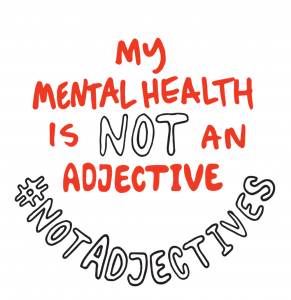THURSDAY: Part Four of our Stand Together, Stick Together #MHAW16 campaign: “My mental health is not an adjective”. Written by Mentality…

Increasingly we are using mental ill health terms more; often in everyday language.
Is this because mental health stigma is being broken down or is it because we are now recycling mental health myths in new ways? “I’m so depressed”, “You’re so OCD and tidy!”, “She’s so skinny, she looks anorexic!”
Mental illness-related words are used to describe people and situations on a daily basis. These words are the names of serious health conditions that are often unbearable and can destroy lives. They are not adjectives to be used freely and casually in our everyday speech.
Mental health vocabulary is almost always used to describe the negative, the irritating and the unusual despite the fact that having a mental illness does make us any of these things. This can lower the self esteem of people suffering from these conditions as well as act as a trigger for difficult thoughts and feelings.
It also stops people from opening up about their mental health and makes them worry about what others will think of them if they do. There are so many other ways for us to express ourselves with making someone feel embarrassed or unable to speak up.
OCD does not qualify tidiness and bipolar does not describe someone who is being aggressive.
This misuse of language is contributing to a closed-minded and closed-mouthed society.
We need to start thinking about how we use mental health related words in our vocabulary.
—
What do you think? Share your thoughts on Mentality’s Facebook, OTR’s Twitter and OTR’s Facebook!